|
Jesse "The Body" Venturaaka James Janos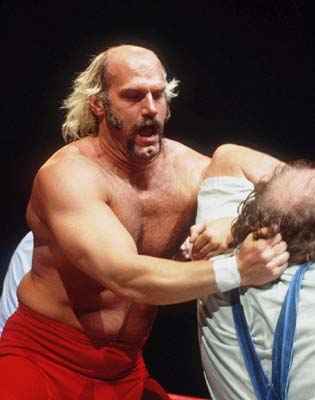 When a professional wrestler bills himself as "The Body," that's usually a good sign that his actual wrestling skills aren't as impressive as his ability to tolerate massive doses of steroids.
When a professional wrestler bills himself as "The Body," that's usually a good sign that his actual wrestling skills aren't as impressive as his ability to tolerate massive doses of steroids. When a politician bills himself as a former professional wrestler, well, that's a good sign the Apocalypse is at hand. James Janos was born in Minnesota in 1951. On graduating high school, Janos joined the Navy in 1969 and became a SEAL, serving for six years, including a tour in Vietnam. By his own admission, the future governor was never fired upon in combat. Janos (soon to be Ventura) has never publicly discussed his Vietnam career in much detail, leading many to assume that either he never served in Vietnam, never served as a SEAL, or (less frequently) that he was involved in some kind of atrocity. Although his critics have tried to make an issue of his Vietnam career (or an alleged lack thereof), none of the various claims have ever stuck. After Vietnam (or whatever), Janos returned to the U.S., where after a brief flirtation with life in a motorcycle gang, he settled down for heady cocktail of college, football and apple pie, the whole American works. When pro wrestling promoters spotted him working out at the local gym, college went out the window, along with the name James Janos. Jesse Ventura was born from an unholy union of Jesse James and the Ventura Highway (the latter derived from a California road map).
One way that Ventura "honored" Graham was by honing his physique into an unnatural musclebound shape. Like his role model (and virtually every other successful professional wrestler), Ventura achieved his ripped look via the miracle of modern chemistry. Ventura has admitted taking steroids anywhere from a "few times" to "occasionally." One might be forgiven for suspecting this was an understatement. Ventura's wrestling career was full of other less-than-wholesome influences as well, including marijuana use and visits to Nevada bordellos. In a throwback to his Navy SEAL days, Ventura rarely wore underwear (a tradition that continues to this day).
In 1984, Ventura was hospitalized for a blood clot in his lung, which led to the end of his in-ring career. Ventura said the condition resulted from his exposure to Agent Orange during Vietnam, a claim which has been met with much skepticism, especially considering that such clots just happen to be a side effect of steroid abuse. Ventura moved to the announce table for the WWF and subsequently for the WCW, where he distinguished himself as a vibrant and articulate personality. He was a heel color commentator, offering up such famous one-liners as "Win if you can, lose if you must, but always cheat." As a commentator, Ventura was known for tossing around racial slurs a little too freely. He was finally ordered to give the "Buckwheat" jokes a rest by WWF owner Vince McMahon, himself a man not exactly renowned for political correctness. Eventually, Ventura jumped to Hollywood for a modestly unsuccessful run as an action hero. The highlight of his movie career was a leading role in Predator (described by Ventura as the only movie to star two future governors). The lowlight was a six- or seven-way tie between various uninspired pieces of crap.
In 1990, Ventura dipped into politics, successfully running for mayor of his home town, Brooklyn Park, Minn. Realizing the great responsibility that comes with being mayor, Ventura promptly applied for a concealed weapon permit, which was refused on the grounds that he had no compelling reason to carry one. He served as mayor through 1995, taking time off for movie shoots and the occasional wrestling cameo. In 1998, Ventura ran for governor of Minnesota as a third-party candidate associated with H. Ross Perot's (Broken link for H. Ross Perot) Reform Party. Despite having only one paid campaign staffer, Ventura wowed the state and garnered national attention with his straight-talk persona and a populist platform culled from a grab bag of libertarian positions that defied political categorization. "The Body" was pro-gun, pro-choice, anti-taxes, pro-gay but anti-gay-marriage, both pro-immigrant and anti-immigrant, anti-voucher, pro-environment, pro-legalization, anti-PAC, pro-free-trade, pro-union and anti-welfare. Ventura's campaign ads were pointed and personable, featuring a well-oiled Ventura posing in boxer shorts for Rodin's The Thinker, two children pitting a limited-edition Gov. Jesse action figure against the evil "Special Interest Man", and Ventura's own reworking of the theme from Shaft: "When the other guys were cashing government checks, he was in the Navy getting dirty and wet."
For a brief shining moment, the Reform Party looked like a viable alternative to the two-party monopoly, but Ventura grew disillusioned with the organization's internal strife and broke away to form the Independence Party in 2000, after it became clear that Perot would brook no challenger to his rapidly fading star. In 2002, Ventura declined to run for re-election as governor. His MSNBC talk show spectacularly imploded after only a handful of outings, and the former governor filled his time with such distractions as a visiting professor stint at Harvard and being inducted into the WWE (formerly WWF) Hall of Fame in 2004. The latter appearance gives you a pretty good idea where this story is going. During his acceptance speech, Ventura dropped the following, oh-so-subtle hint: "Maybe in 2008, we put a wrestler in the White House." Ventura has been pretty open about his presidential ambitions, but he's probably underestimating the news media and overestimating his Reaganesque Teflon coating. The sensational story of his gubernatorial bid was sexy enough that most major media outlets looked the other way regarding his many confessions of "youthful indiscretion," almost every single one of which appears to have been dramatically understated in Ventura's telling.
On the other hand, when you look at our last two presidents, maybe Ventura's indiscretions aren't so bad. Between Bill Clinton and George W Bush, you have a rap sheet that includes allegations and proven transgressions that include rampant horndoggery, marijuana use, cocaine abuse, drunk-driving, and multiple flavors of business fraud, draft evasion and lying about military records. The sordid life of a professional wrestler on the road almost looks tame by comparison. Then there is the question about whether the maverick governor would be able to deal with the fishbowl life of a U.S. president. As the ever-pragmatic Ventura told AP in 2004: "I love my freedom. The part that would bug me is I wouldn't be able to get up in the night and drive to the 7-11 for a Slurpee, not without them blocking off the roads, welding the manhole covers shut, and everything else that goes along with it." The Great White Hunter SpeaksJESSE VENTURA: And you don't consider war hunting? We pray to God he's talking about Vietnam. Professional JealousyHulk Hogan "retired" from wrestling about the same time Ventura was elected governor of Minnesota. Appearing on The Tonight Show shortly after, he couldn't stand to let another wrestler have the limelight even for a moment.HOGAN: But you know all good things come to an end. I've had a great time. The fans have been great. I love you guys, thanks for sticking with me. And this is a segue for me being the President of the United States. All right, hypothetical question. If I ran against Bill Clinton today, who would you vote for? [APPLAUSE] Obviously, this never happened, or we would have had a steel cage match instead of the current debacle in Iraq. Maybe in 2008, it will be Ventura vs. Hogan for the White House. It's a sign of Hogan's delusional worldview that he predicted (apparently seriously) the following outcome if such a showdown were to take place: HOGAN: Everything I've always done against Jesse I've always won. It would be a lot of fun to just beat him one more time.
Timeline
|
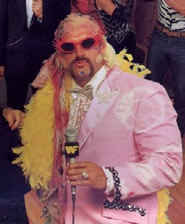 Ventura wrestled in the Midwest territories during the '70s, playing a gimmick that was... well, let's call it a "tribute" to "Superstar" Billy Graham. You could also call it a "ripoff."
Ventura wrestled in the Midwest territories during the '70s, playing a gimmick that was... well, let's call it a "tribute" to "Superstar" Billy Graham. You could also call it a "ripoff." 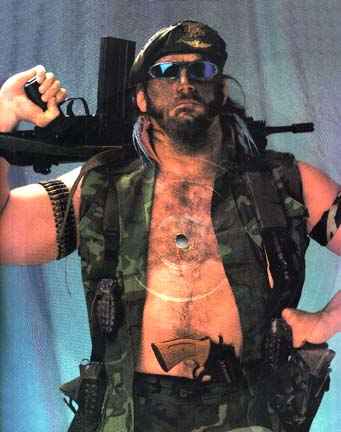 Ventura decked himself out in feather boas and flamboyant tights, embarking on a fairly good run through the wrestling industry. "The Body" rose through the territories, with Bobby "the Brain" Heenan as his manager, but he quickly learned to speak for himself and eventually became one of the all-time great talkers in the business. In the ring, his technical wrestling skills were less than sterling, but he made the most of what he had. In the 1980s, he moved to WWF, where he rose to the top tier of main-eventers, facing off against the biggest names of the day, including Hulk Hogan.
Ventura decked himself out in feather boas and flamboyant tights, embarking on a fairly good run through the wrestling industry. "The Body" rose through the territories, with Bobby "the Brain" Heenan as his manager, but he quickly learned to speak for himself and eventually became one of the all-time great talkers in the business. In the ring, his technical wrestling skills were less than sterling, but he made the most of what he had. In the 1980s, he moved to WWF, where he rose to the top tier of main-eventers, facing off against the biggest names of the day, including Hulk Hogan.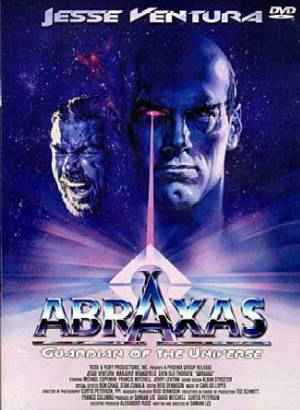 Ventura made his first and last appearance at the top of the bill in Abraxas, Guardian of the Universe, a shameless (and artless) ripoff of Jack Kirby's comic book classic, The New Gods. The movie was dead on arrival in theaters, later distinguishing itself on video as a cult classic from the Ed Wood school of filmmaking.
Ventura made his first and last appearance at the top of the bill in Abraxas, Guardian of the Universe, a shameless (and artless) ripoff of Jack Kirby's comic book classic, The New Gods. The movie was dead on arrival in theaters, later distinguishing itself on video as a cult classic from the Ed Wood school of filmmaking. 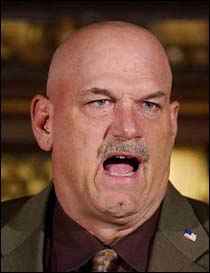 Voter turnout in Minnesota was 60 percent, far higher than the rest of the nation, which was burned out on politics thanks to
Voter turnout in Minnesota was 60 percent, far higher than the rest of the nation, which was burned out on politics thanks to 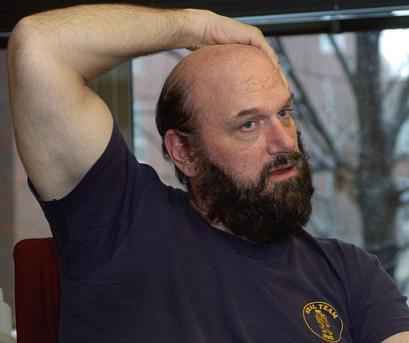 From steroids to dabbling in marijuana, from prostitutes to Vietnam, from his M.I.A. underwear to Buckwheat jokes, Ventura's past is a lush field of low-hanging fruit for a scandal-starved media, and it's easier to overlook indiscretions in the governor of Minnesota than in the president of the United States.
From steroids to dabbling in marijuana, from prostitutes to Vietnam, from his M.I.A. underwear to Buckwheat jokes, Ventura's past is a lush field of low-hanging fruit for a scandal-starved media, and it's easier to overlook indiscretions in the governor of Minnesota than in the president of the United States.